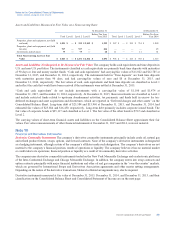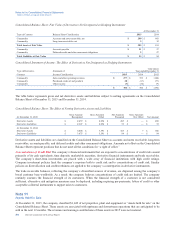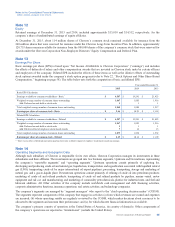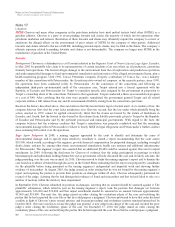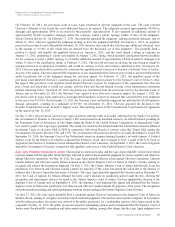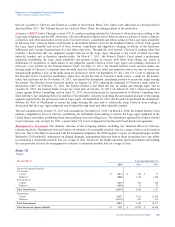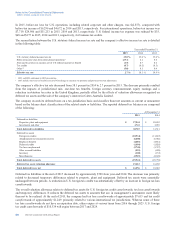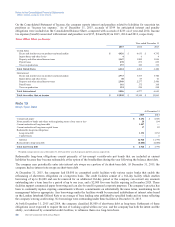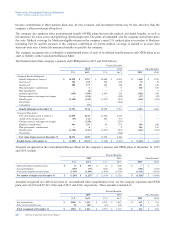Chevron 2015 Annual Report Download - page 54
Download and view the complete annual report
Please find page 54 of the 2015 Chevron annual report below. You can navigate through the pages in the report by either clicking on the pages listed below, or by using the keyword search tool below to find specific information within the annual report.Notes to the Consolidated Financial Statements
Millions of dollars, except per-share amounts
procured through fraud and corruption and cannot be recognized in Brazil because it violates Brazilian and international public
order.
On October 15, 2012, the provincial court in Lago Agrio issued an ex parte embargo order that purports to order the seizure
of assets belonging to separate Chevron subsidiaries in Ecuador, Argentina and Colombia. On November 6, 2012, at the
request of the Lago Agrio plaintiffs, a court in Argentina issued a Freeze Order against Chevron Argentina S.R.L. and
another Chevron subsidiary, Ingeniero Norberto Priu, requiring shares of both companies to be “embargoed,” requiring third
parties to withhold 40 percent of any payments due to Chevron Argentina S.R.L. and ordering banks to withhold 40 percent
of the funds in Chevron Argentina S.R.L. bank accounts. On December 14, 2012, the Argentinean court rejected a motion to
revoke the Freeze Order but modified it by ordering that third parties are not required to withhold funds but must report their
payments. The court also clarified that the Freeze Order relating to bank accounts excludes taxes. On January 30, 2013, an
appellate court upheld the Freeze Order, but on June 4, 2013 the Supreme Court of Argentina revoked the Freeze Order in its
entirety. On December 12, 2013, the Lago Agrio plaintiffs served Chevron with notice of their filing of an enforcement
proceeding in the National Court, First Instance, of Argentina. Chevron filed its answer on February 27, 2014, to which the
Lago Agrio plaintiffs responded on December 29, 2015.
Chevron continues to believe the provincial court’s judgment is illegitimate and unenforceable in Ecuador, the United States
and other countries. The company also believes the judgment is the product of fraud, and contrary to the legitimate scientific
evidence. Chevron cannot predict the timing or ultimate outcome of the appeals process in Ecuador or any enforcement
action. Chevron expects to continue a vigorous defense of any imposition of liability in the Ecuadorian courts and to contest
and defend any and all enforcement actions.
Company’s Bilateral Investment Treaty Arbitration Claims Chevron and Texpet filed an arbitration claim in
September 2009 against the Republic of Ecuador before an arbitral tribunal presiding in the Permanent Court of Arbitration
in The Hague under the Rules of the United Nations Commission on International Trade Law. The claim alleges violations of
the Republic of Ecuador’s obligations under the United States–Ecuador Bilateral Investment Treaty (BIT) and breaches of
the settlement and release agreements between the Republic of Ecuador and Texpet (described above), which are investment
agreements protected by the BIT. Through the arbitration, Chevron and Texpet are seeking relief against the Republic of
Ecuador, including a declaration that any judgment against Chevron in the Lago Agrio litigation constitutes a violation of
Ecuador’s obligations under the BIT. On February 9, 2011, the Tribunal issued an Order for Interim Measures requiring the
Republic of Ecuador to take all measures at its disposal to suspend or cause to be suspended the enforcement or recognition
within and without Ecuador of any judgment against Chevron in the Lago Agrio case pending further order of the Tribunal.
On January 25, 2012, the Tribunal converted the Order for Interim Measures into an Interim Award. Chevron filed a renewed
application for further interim measures on January 4, 2012, and the Republic of Ecuador opposed Chevron’s application and
requested that the existing Order for Interim Measures be vacated on January 9, 2012. On February 16, 2012, the Tribunal
issued a Second Interim Award mandating that the Republic of Ecuador take all measures necessary (whether by its judicial,
legislative or executive branches) to suspend or cause to be suspended the enforcement and recognition within and without
Ecuador of the judgment against Chevron and, in particular, to preclude any certification by the Republic of Ecuador that
would cause the judgment to be enforceable against Chevron. On February 27, 2012, the Tribunal issued a Third Interim
Award confirming its jurisdiction to hear Chevron’s arbitration claims. On February 7, 2013, the Tribunal issued its Fourth
Interim Award in which it declared that the Republic of Ecuador “has violated the First and Second Interim Awards under
the [BIT], the UNCITRAL Rules and international law in regard to the finalization and enforcement subject to execution of
the Lago Agrio Judgment within and outside Ecuador, including (but not limited to) Canada, Brazil and Argentina.” The
Republic of Ecuador subsequently filed in the District Court of the Hague a request to set aside the Tribunal’s Interim
Awards and the First Partial Award (described below), and on January 20, 2016, the District Court denied the Republic’s
request.
The Tribunal has divided the merits phase of the proceeding into three phases. On September 17, 2013, the Tribunal issued its First
Partial Award from Phase One, finding that the settlement agreements between the Republic of Ecuador and Texpet applied to
Texpet and Chevron, released Texpet and Chevron from claims based on “collective” or “diffuse” rights arising from Texpet’s
operations in the former concession area and precluded third parties from asserting collective/diffuse rights environmental claims
relating to Texpet’s operations in the former concession area but did not preclude individual claims for personal harm. The Tribunal
held a hearing on April 29-30, 2014, to address remaining issues relating to Phase One, and on March 12, 2015, it issued a
nonbinding decision that the Lago Agrio plaintiffs’ complaint, on its face, includes claims not barred by the settlement agreement
between the Republic of Ecuador and Texpet. In the same decision, the Tribunal deferred to Phase Two remaining issues from
Phase One, including whether the Republic of Ecuador breached the 1995 settlement agreement and the remedies
52 Chevron Corporation 2015 Annual Report



